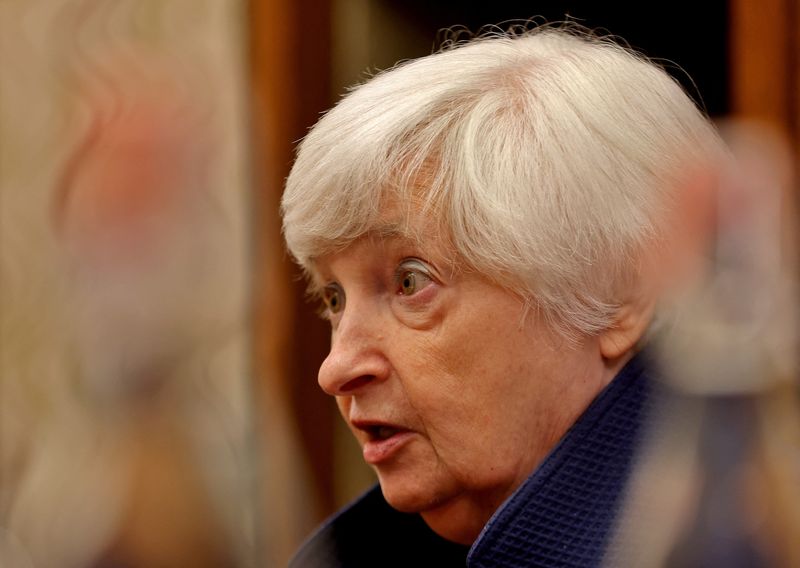Yellen’s warning, Buffett talks banking turmoil – what’s moving markets
2023.05.08 07:21

© Reuters
Investing.com — U.S. Treasury Secretary Janet Yellen warns of a possible “constitutional crisis” hanging over the high-stakes debt-ceiling negotiations in Washington. Warren Buffett, meanwhile, draws down Berkshire Hathaway’s exposure to U.S. banks as he hits out at executives, regulators, and the media over the U.S. banking sector crisis.
1. Yellen’s debt ceiling warning
An “economic and financial catastrophe” awaits the U.S. if lawmakers in Washington fail to agree to raise the debt ceiling, Treasury Secretary Janet Yellen warned in an interview over the weekend.
Speaking to ABC News, Yellen stressed that these negotiations cannot be held “with a gun to the head of the American people.” But the stakes remain high and time short.
President Biden and his counterparts in Congress face a so-called “X-date” – estimated to be as soon as early June – to increase the country’s debt limit. If a deal cannot be hashed out, the U.S. government risks not being able to pay its bills on time.
The White House is reportedly looking into whether it has the authority to keep issuing new debt without Congressional approval. Yellen, however, flagged that such a scenario would constitute a “constitutional crisis.”
2. U.S. stock futures subdued
U.S. stock futures were mixed on Monday, but hovered mostly around the flatline, as traders eyed the release of key inflation data later this week.
At 05:33 ET (09:33 GMT), the contract was up 40 points or 0.12%, while traded 2 points or 0.04% higher and tech-heavy dipped by 13 points or 0.10%.
Focus this week is squarely on U.S. inflation data, due out on Wednesday. The reading is expected to show that while inflation eased slightly in April, it still remained well above the Federal Reserve’s 2% annual target range.
The evolution of price growth last month could give investors further clues about the Fed’s monetary policy plans. The U.S. central bank raised borrowing costs by 25 basis points last week, but hinted that this would be the peak of its year-long aggressive tightening cycle by removing from its accompanying statement the phrase that it “anticipates” more hikes.
3. Loan officer survey looms large
As economic indicators go, the Federal Reserve’s Senior is, typically, not very closely watched.
But with volatility gripping the U.S. banking sector – and midsize lenders in particular – eyes will be on the report, which is set to be released later today.
Observers will be keen to find out just how much lending conditions have tightened at these regional banks. No forecasts are usually given, but 44.8% of respondents in the previous survey in January said that standards were tightening.
According to Reuters, if the number jumps to 60.2%, it would be in line with levels touched during the last four recessions. Fed chair Jerome Powell noted last week that, in the event of this bump up in tightening, the U.S. central bank “may not be far off” from the “neutral rate” – or a borrowing cost that neither stimulates nor restricts economic growth.
4. Buffett on banking sector turmoil
Warren Buffett weighed in on the volatility roiling the U.S. financial services industry at Berkshire Hathaway’s (NYSE:) annual meeting in its hometown of Omaha, Nebraska over the weekend. His criticism spared few of the crisis’s major players.
Bank executives, regulators, and the press were guilty of “very poor” messaging around the collapse of Silicon Valley Bank, Signature Bank, and First Republic Bank, the famed investor argued. This contributed to a growing “fear of contagion” that the turmoil could spread to other lenders.
He added that banking leaders and shareholders should “suffer” if their business flounders. “You have to have punishment for people who do the wrong thing,” Buffett declared.
Unsurprisingly, he said Berkshire is now taking a more cautious stance towards banks and has indeed sold some of its shares in these companies over the past six months.
5. Recession worries resurface in Germany
A buoyant performance in Germany’s industrial sector to begin 2023 is showing signs of petering out – and stoking fears of a recession in Europe’s largest economy in the process.
for the country slipped by more than anticipated in March on a monthly basis, federal data showed on Monday, due partly to weakness in the automotive sector. In the prior two months of the year, the reading had grown by far above estimates.
Analysts at ING said that, given a dip in and in the same time period, the chances of a downward revision to first quarter economic activity in Germany have increased.








